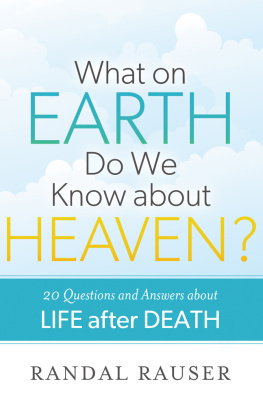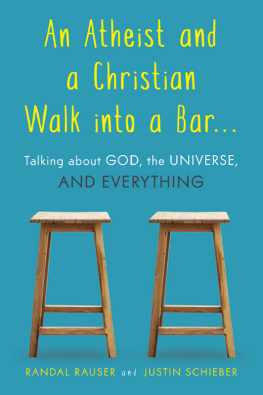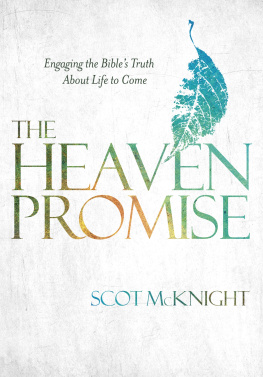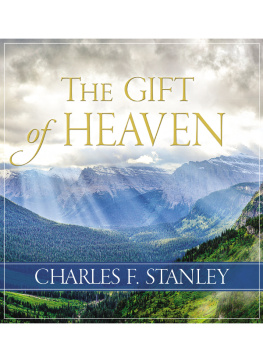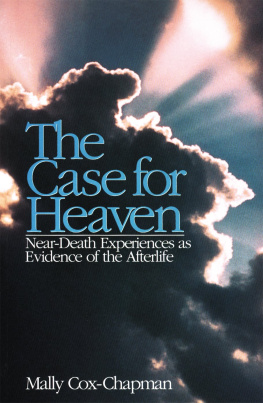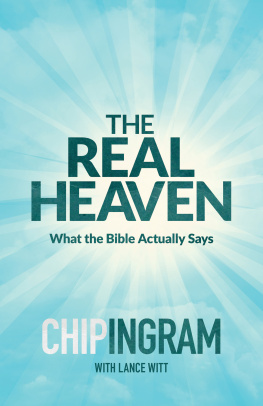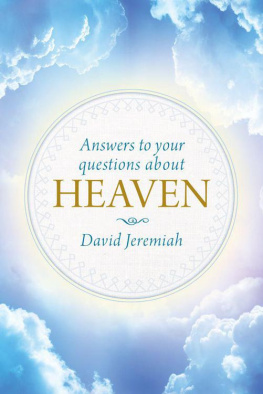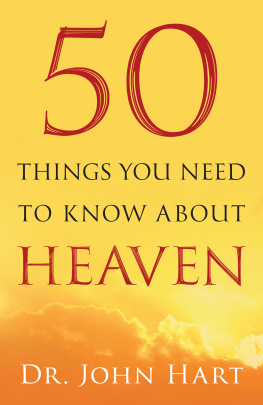
2013 by Randal Rauser
Published by Baker Books
a division of Baker Publishing Group
P.O. Box 6287, Grand Rapids, MI 49516-6287
www.bakerbooks.com
Ebook edition created 2013
All rights reserved. No part of this publication may be reproduced, stored in a retrieval system, or transmitted in any form or by any meansfor example, electronic, photocopy, recordingwithout the prior written permission of the publisher. The only exception is brief quotations in printed reviews.
Library of Congress Cataloging-in-Publication Data is on file at the Library of Congress, Washington, DC.
ISBN 978-1-4412-4270-9
Unless otherwise indicated, Scripture quotations are from the Holy Bible, New International Version. NIV. Copyright 1973, 1978, 1984, 2011 by Biblica, Inc. Used by permission of Zondervan. All rights reserved worldwide. www.zondervan.com
Scripture marked KJV is taken from the King James Version of the Bible.
As with any unknown, the concept and reality of heaven present us with great mysterybut also great blessing. Our challenge is wrapping our brains and our Bibles around the questions. Randal Rausers book does a beautiful job of both, guiding us toward answers to our most common questions while also helping us connect how our present lives should be influenced by those truths. I would encourage believers of any age to read this book in order to learn more about what is too often unexplored: the hope and promise of a real heaven!
David D. Swanson , senior pastor, First Presbyterian Church, Orlando, FL; author of Everlasting Life
I love Randal Rauser because he loves to ask questions, especially hard and controversial questions. And not only does he like to ask them, but he is courageous enough to offer responses. This book on heaven follows that very pattern, and even if you do not agree with all of Randals answers, you will find yourself enjoying how much he stretches you in the process. In the end, each of us ends up wondering how we might answer the question. Whatever your answer, it will be much more thoughtful because you have read Rauser.
Kelly M. Kapic , professor of theological studies, Covenant College
What a fascinating book! Randal Rauser has a wonderful way of looking at issues from a different but very interesting perspectiveand he clearly does that in this volume. The questions he asks are intriguing. The answers he suggests are thought provoking. The approach he takes is engaging. This book will motivate you to think more deeply about an issue youve always wondered about: What is heaven really like?
George W. Sarris, actor; author; Engaging the Culture blogger, ChristianPost.com
Contents
Cover
Title Page
Copyright Page
Endorsements
Dedication
A Most Heavenly Equation
Part 1: A World Multiplied by Perfection
Question 1: Where Is Heaven Now?
Question 2: What Does It Mean That Heaven Will Be the Earth Perfected?
Question 3: Will the New Earth Include Other Galaxies?
Question 4: What Is God Saving the Universe From?
Question 5: Will We Recognize the Earth When It Is Renewed?
Part 2: Perfect People in a Perfect World
Question 6: How Old Will We Beand Will We Get Older?
Question 7: Will We All Be Beautiful?
Question 8: Will Anyone Be Deaf?
Question 9: Will We Still Get Thirsty, Hungry, and Sleepy?
Question 10: Will There Be Sweet Melancholy?
Part 3: Exploring the Perfect Earthiness of Heaven
Question 11: Will the Titanic Sail Again?
Question 12: Will God Resurrect Entire Cultural Neighborhoods?
Question 13: Will God Resurrect Insects?
Question 14: Will Tigers Still Hunt Wild Boar?
Part 4: Relationships Perfected
Question 15: Will We Walk with Jesus in the Garden?
Question 16: Will We Love Everyone the Same, or Will We Have Special Friends?
Question 17: Will We Find Intelligent Aliens There?
Question 18: Will We Still Have Free Will?
Part 5: Hell
Question 19: If My Child Goes to Hell, Will I Know and Will I Care?
Question 20: Should We Hope That Everyone Will Be Saved?
Afterword: Waiting for the Dream Car
Acknowledgments
Notes
About the Author
Back Ads
Back Cover
A Most Heavenly Equation
L ike many people, when I see an equation, my eyes tend to glaze over. So it is a matter of some irony that when I sat down to write a book on heaven, I ended up basing it on an equation. But the reason is simple: despite the potential of equations alienating an audience, they also are a powerful way of summarizing very important truths.
Just consider what is arguably the most famous scientific equation of them all: E = mc. While Einsteins equation has become emblematic of erudite scientific complexity, the basic idea is actually as simple as it is amazing. The equation asserts that matter and energy, the two great kingdoms that compose everything in the universe, are not fundamentally different as common sense indicates. On the contrary, they are essentially linked. Indeed, energy is just matter in another form. Or to turn it around, matter is simply condensed energy. And under the right conditions, the one can be turned into the other.
This brings us to the one truth that most people connect to E = mc. It was the foundational discovery that made the atomic bomb possible, for an atomic bomb is simply a weapon that turns a small amount of unstable matter into enough energy to level cities. The influence of the equation, however, extends far beyond the conduct of warfare. One author explains the sweeping effect of E = mc on our world like this:
When the Eiffel Tower is lit at night, the electricity comes from a slower reenactment of the exploding ancient atoms that took place over Hiroshima.... In the smoke detectors screwed tight to the kitchen ceiling, theres usually a sample of radioactive americium inside. The detector gets enough power by sucking mass out of that americium and using it as energyin exact accord with the equationthat it can generate a smoke-sensitive charged beam, and keep on doing so for months or years on end.
The red-glowing exit signs in shopping malls and movie theaters depend directly on E = mc as well. These signs cant rely on ordinary light sources, because theyd fail if the electricity went out in a fire. Instead, radioactive tritium is sealed inside. The signs contain enough fragile tritium nuclei that mass is constantly lost, and usefully glowing energy sprays out instead.
Think about how amazing that is. A single equation has changed our world, from the Eiffel Tower to exit signs to atomic bombs. Heres the lesson: Great equations are not irrelevant to us. Indeed, they have the potential to transform the world. Not surprisingly, this is a double-edged sword. While understanding and applying great equations rightly has the power to transform the way we see reality, getting them wrong, or misapplying them, can wreak untold destruction.
More Amazing Than E = mc
As amazing as it is to think that matter can be transformed into energy, the equation at the heart of this book posits an even grander linkageone that makes E = mc look small by comparison. You see, this equation asserts the unity of heaven and earth:
H = ep
As you may have guessed, the H refers to heaven. As for ep , that refers to earth multiplied by perfection. So the core claim of the equation that forms the central thesis of this book is that heaven is earth multiplied by perfection .
As I said, this is much bigger than E = mc.
It also confounds the received wisdom of many Christians who have long assumed that heaven and earth are two separate kingdoms, much like the way people used to view energy and matter. According to the heavenly equation, thats fundamentally wrong. Just as Einsteins equation asserts that under the right conditions, matter can be transmuted into energy, so according to the heavenly equation, under the right conditionsconditions that God will realizeearth can be, indeed will be, transformed into heaven.

